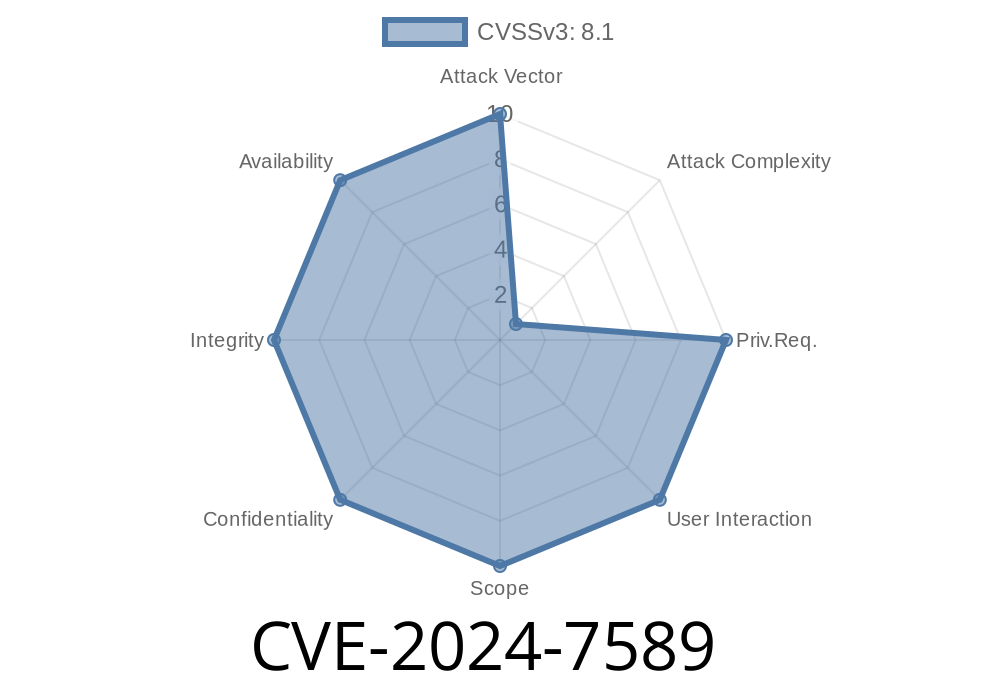In June 2024, a new security vulnerability was discovered in the OpenSSH daemon (sshd) shipped with FreeBSD. Labeled CVE-2024-7589, this flaw closely resembles the celebrated CVE-2024-6387 "regreSSHion" bug, but is rooted in a faulty signal handler tied to the integration of blacklistd in OpenSSH. This flaw has the potential to let an *unauthenticated attacker* take control of a FreeBSD system as root over SSH—without valid credentials.
Let’s break down what makes this bug dangerous, how the code works, why the flaw happens, and the potential paths an attacker may use to exploit it.
Component affected: OpenSSH (sshd) shipped with FreeBSD, when built with blacklistd support.
- Vulnerable signal handler: Invoked when an SSH client fails to authenticate within the LoginGraceTime (default 120s).
- Root cause: Calls non-async-signal-safe functions (syslog, others), introducing a race condition during signal handling.
What’s a Signal Handler, and Why It’s Tricky?
*Signal handlers* are special routines called by the kernel when a process receives certain signals (like SIGALRM, used for timeouts).
Rules of the Game: Signal handlers are allowed to call only “async-signal-safe” functions—essentially, very simple low-level routines from libc. Calling a “regular” (not async-signal-safe) function (like printf, malloc, syslog, etc.) from within a signal handler can result in race conditions, memory corruption, or even arbitrary code execution under the right (wrong!) circumstances.
Where’s the Bug? The Dangerous Signal Handler
In FreeBSD’s sshd, a signal handler for SIGALRM is used to forcibly disconnect clients that haven’t logged in within the grace period. Critically, the implementation calls out to the FreeBSD blacklistd system—logging failed authentication attempts for potential blocking.
Faulty logic: The logging function used here isn’t async-signal-safe. If, while handling the signal, other functions like syslog or malloc are interrupted and re-entered, process memory can be left in a corrupt state, or attacker-controlled data might get executed.
Here’s a simplified snippet to illustrate the pattern
#include <signal.h>
#include <syslog.h>
void my_handler(int sig) {
// BAD: syslog is not async-signal-safe!
syslog(LOG_WARNING, "Login grace time expired");
blacklist_check(); // also not safe in signal handler!
}
int main() {
signal(SIGALRM, my_handler);
alarm(120);
// ... SSHD main loop ...
}
A real fragment from FreeBSD’s OpenSSH integration with blacklistd
static void grace_alarm_handler(int sig)
{
if (blacklist)
blacklist_r(host, user, ...); // Not async-signal safe!
logit("Login grace time expired"); // Not async-signal safe!
exit(255);
}
Original FreeBSD advisory:
CVE-2024-7589 entry:
OpenSSH blacklistd docs:
Qualys research on regreSSHion:
Exploit Path: How Might an Attacker Abuse This?
1. Connect Repeatedly: The attacker opens hundreds or thousands of SSH connections to the vulnerable server, purposely never authenticating.
2. Trigger Race: Each connection causes sshd to set a SIGALRM timeout (LoginGraceTime, usually 120 seconds). When this fires, the buggy signal handler runs in the main privileged process, as root.
3. Exploit Race: By careful timing (brute-force or exploiting memory layout determinism), the attacker attempts to hit moments when internal buffers are in a bad state. Signal handler re-entry can corrupt memory, control data, or heap structures—potentially allowing execution of attacker-controlled code as root.
4. Remote Root: Successful exploitation leads to arbitrary code execution (ACE) as root—*before* authentication, i.e., without even knowing a valid login.
This is, in effect, a classic *signal-safety* race condition attack—unstable, tricky, but catastrophic if achieved.
A full working RCE exploit is not disclosed, but here’s an illustrative approach
# WARNING: This is for educational purposes only.
# Connects repeatedly to trigger many LoginGraceTime expiries.
import socket
import threading
from time import sleep
TARGET = "victim.example.com"
PORT = 22
CONNECTIONS = 100
def keep_alive():
s = socket.socket(socket.AF_INET, socket.SOCK_STREAM)
s.settimeout(5)
try:
s.connect((TARGET, PORT))
# do not send any data; wait for server to drop after grace time
sleep(130)
except Exception as e:
pass # ignore connection failures
finally:
s.close()
threads = [threading.Thread(target=keep_alive) for _ in range(CONNECTIONS)]
for t in threads:
t.start()
sleep(2) # start wave 2, repeat
A determined attacker might mix these "hang" connections with attempts to fill server memory, or manipulate heap state, in coordination with multiple grace-time expiries to try for memory corruption.
## How to Fix / Mitigate
- Update OpenSSH/FreeBSD:
Install the latest security updates, which patch the signal handler to avoid calling non-async-signal-safe functions.
Conclusion
CVE-2024-7589 is a glaring example that *simple mistakes in system programming—especially with signal handlers—can have devastating security effects.* If you run FreeBSD’s OpenSSH with blacklistd enabled, patch immediately. Don’t wait for a mass exploit wave.
🛡️ Always follow prompt security advisories and err on the side of caution with Unix daemons running as root.
Timeline
Published on: 08/12/2024 13:38:44 UTC
Last modified on: 08/12/2024 16:35:05 UTC
